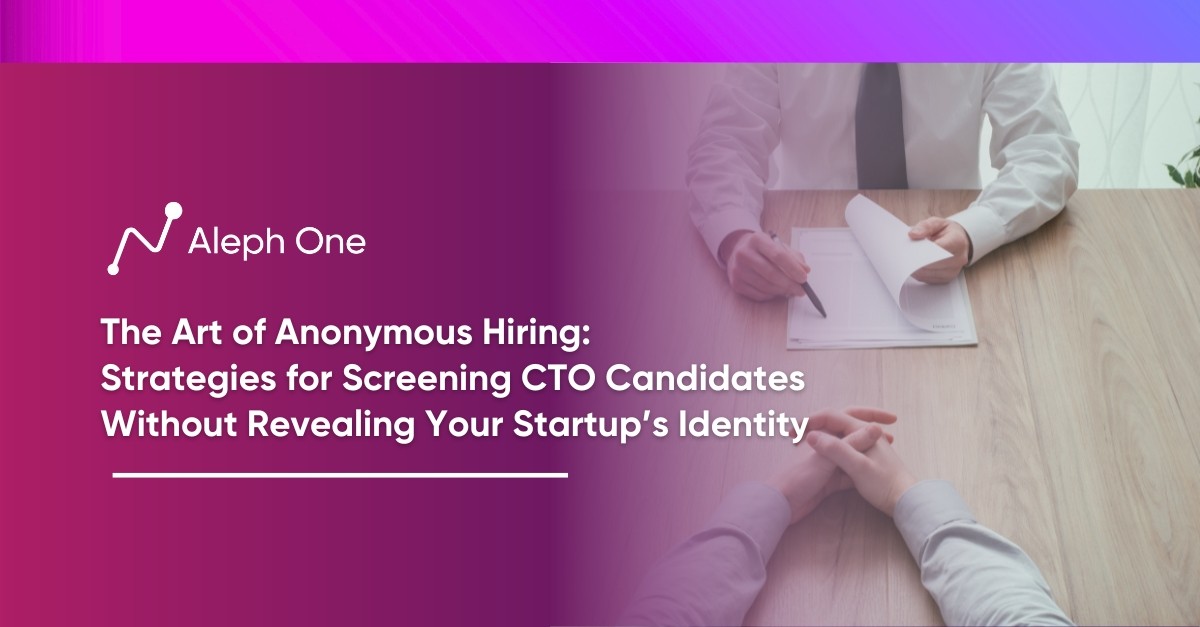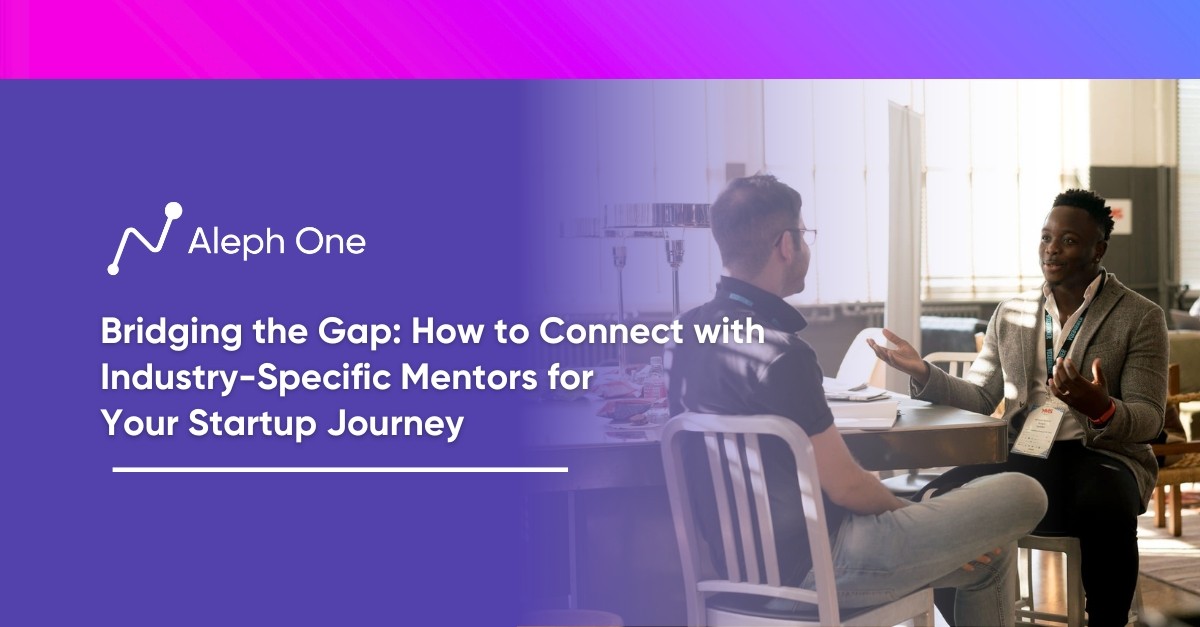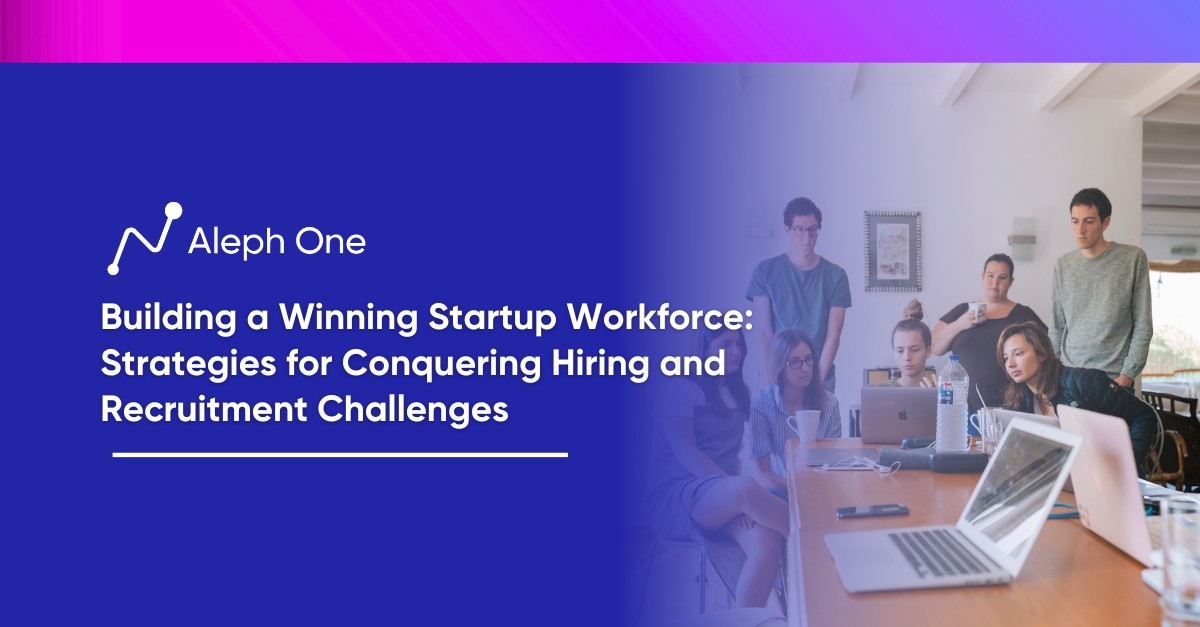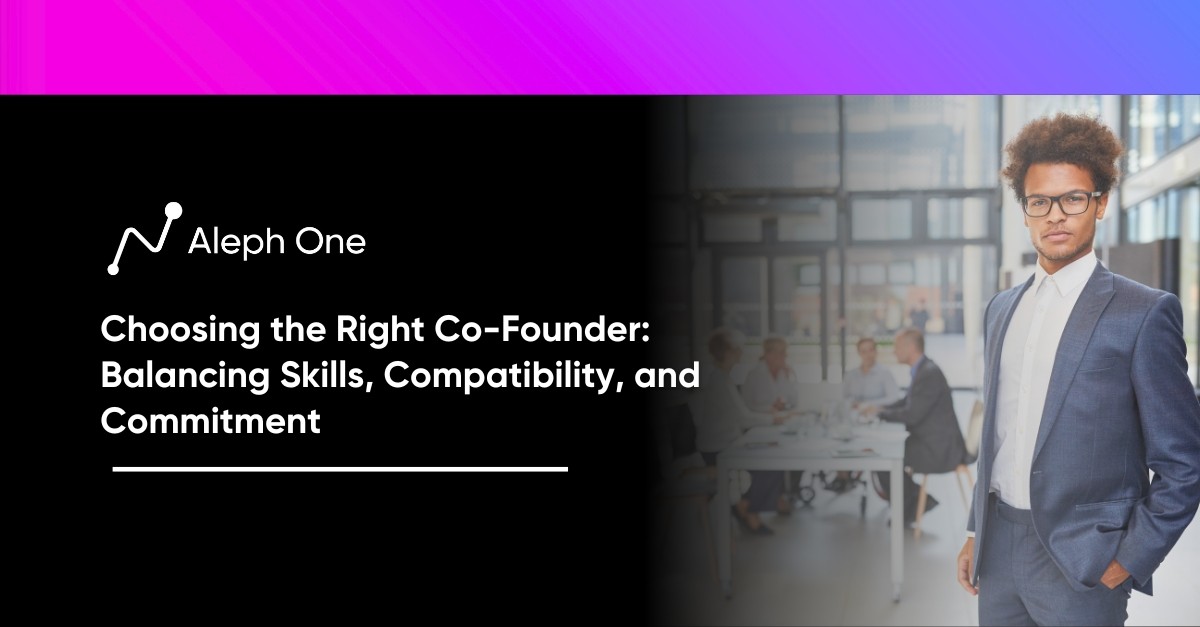Let’s work together to build something amazing. Share your project details and our team will reply to figure out the next steps to your success.

In the world of startups, finding the right Chief Technology Officer (CTO) can be a make-or-break moment for a budding company. The CTO plays a pivotal role in shaping the technological vision and driving innovation, making it imperative to select an individual with the perfect blend of technical expertise, leadership prowess, and cultural fit. However, traditional hiring methods often require disclosing the startup’s identity, leaving it vulnerable to poaching, increased competition, and biased evaluations. That’s where the art of anonymous hiring comes into play–a strategic approach that empowers venture capital firms to thoroughly screen CTO candidates without revealing their startup’s identity, offering a discreet advantage in pursuing exceptional talent. In this article, we dive into the innovative strategies and best practices for leveraging anonymity during the hiring process, ensuring a secure and unbiased evaluation of CTO candidates that can set your startup on the path to success.

The Hidden Benefits: How Anonymous Hiring Boosts Diversity
Anonymous hiring, the practice of removing personally identifiable information from job applications before evaluation, has significantly boosted workplace diversity. Several studies have found that evaluating candidates based primarily on their qualifications and skills rather than their gender, ethnicity, or other attributes increases the likelihood of hiring underrepresented groups.
The Impact of the Blind Evaluation Process
Several technology companies have found success with anonymous hiring. Toptal, a freelance talent network, built their platform to evaluate candidates based primarily on skills and reviews, not profiles or resumes. As a result, Toptal’s network includes a higher proportion of female engineers than most tech companies. The CEO credits their blind evaluation process for reducing the impact of gender bias.
Establishing Fair Policies and Inclusive Culture
While anonymous hiring is not a silver bullet, and companies still need to work to establish fair policies and an inclusive culture, it has been shown to expand opportunities for underrepresented groups. By focusing on qualifications before attributes, anonymous hiring helps give candidates a fair chance based on merit alone. Companies seeking the best talent that can make a world of difference.
Uncovering the Truth: Common Myths About Anonymous Hiring Debunked
Anonymous hiring is often misunderstood as an unrealistic or ineffective method for finding strong candidates. However, the evidence does not support many common myths about anonymous hiring.
Myth: A Difficult Evaluation Process
One myth is that anonymous hiring needs to be made easier to evaluate candidates properly. In reality, anonymous applications still contain the same information as traditional applications, such as skills, experience, education, and accomplishments—the only difference is removing personal details like names, photos, and gender pronouns that could introduce bias.
Myth: Missing Out on the Best Candidates
Another myth is that anonymous hiring will prevent companies from finding the best candidates for the job. However, studies show that the candidates hired through anonymous processes are equally or better qualified for roles. When orchestras began using blind auditions in the 1970s, the quality of musicians hired increased. Anonymous hiring also expands the pool of applicants by giving underrepresented groups a fair chance, allowing companies to tap into more high-potential candidates.
Myth: Unsuitable for Senior Roles and Small Companies
Some argue anonymous hiring cannot work for senior roles or small companies where personal relationships matter. But even for positions where culture fit is essential, the initial application screening can be done anonymously, with full disclosure of candidates’ identities, allowing holistic evaluation of finalists. Small companies may benefit the most from anonymous hiring since they have fewer resources to correct biased decisions.
The Reward of Fair and Unbiased Hiring
While anonymous hiring may require extra effort, many companies find that the rewards of a fair and unbiased hiring process outweigh the challenges. With the right policies and technologies, anonymous hiring is feasible for most roles and organizations. Fighting misconceptions about this approach is critical to overcoming resistance to change and creating workplaces where people are judged based solely on their merit.
A Brief History of Fighting Bias: The Origins of Anonymous Hiring
Anonymous hiring practices have existed since the 1970s when orchestras began using blind auditions to reduce gender bias in hiring musicians. In the early days of orchestras, very few positions were held by women. Orchestra leaders realized that unconscious bias and stereotypes were negatively influencing hiring decisions.
Orchestrating Diversity in the Music Industry
To address this, they started using blind auditions where musicians would perform behind a screen. The judges could only evaluate them based on their performance, not on their gender or appearance. This method was very successful in helping orchestras diversify. For example, when blind auditions began being used for violinists in the 1970s, the percentage of female violinists in orchestras increased from 5% to 25% over the course of 20 years.
An Early Adoption of Anonymous Hiring
The success of blind auditions inspired companies in other industries to adopt similar anonymous hiring methods. For example, some technology companies started removing names, photos, and further identifying details from job applications in the early 2000s. The aim was to reduce unconscious bias against women and underrepresented minorities.
A study of an anonymous hiring experiment at a tech company found that hiding demographic details led to a 36% increase in job offers to underrepresented groups. This demonstrated that, like with orchestras, anonymous hiring could help reduce bias and promote diversity in the tech industry.
From Niche to Mainstream
Since then, anonymous hiring has gained more mainstream interest as a way to build fairer, more equitable hiring processes. However, some companies need to be faster to adopt anonymous methods out of misconceptions about their effectiveness or feasibility. Still, as research proves the benefits, more workplaces recognize that anonymous hiring is a key strategy for cultivating diverse, unbiased environments. Overall, anonymous hiring has a short but impactful history as a method for promoting equal opportunity. With a proven track record of success, its potential to positively shape the future of work is huge.
The Right (Anonymous) Way: Best Practices for Implementation
Companies need to establish standard procedures and policies to implement anonymous hiring effectively. First, all personally identifiable information should be removed from applications, including names, photos, gender pronouns, and educational institutions. Candidates can be given an ID number to track them through the process.
Focusing on the Basics During Initial Screening
During the initial application screening, focus only on skills, experience, and qualifications for the role. Those involved in screening should have clear criteria to evaluate candidates objectively. Have multiple screeners review each application independently before comparing notes.
Get Creative with Phone Interviews
For phone or video interviews, use voice modulation software to mask candidates’ voices and avoid revealing details that could expose their identities. Stick to questions directly relevant for the role and avoid personal topics. Interviewers should score or rank candidates based on their answers alone.
Hold In-Person Interviews in a Neutral Place
In-person interviews pose more challenges but are still possible. Hold interviews in a neutral location away from the company office. Instruct interviewers not to ask for names or make assumptions based on appearance. Have a consistent set of competency-based questions for all candidates.
Look at Performance in Relation to the Role
When evaluating final candidates, look at their performance and potential in relation to the role—not how well they “fit” with the team. Focus on skills, strengths, and growth areas. Compare candidates’ answers and scores in a collaborative, unbiased discussion.
Reveal Top Candidates’ Identities Before Making an Offer
Once top candidates are selected, their identities can be revealed before making an offer. Explain the anonymous hiring process and its benefits. Be transparent about the next steps, salary, and other details.
Go Beyond Technology: Implementing Fair Policies
Technology like voice masking tools, skills assessment platforms, and applicant tracking systems with “blind” features can help facilitate anonymous hiring. But technology is needed. Companies must also commit to fair policies, ongoing training about unconscious bias, and building an inclusive culture where people are judged based on their merits alone. With the right approach, anonymous hiring can be implemented for most roles and yield a more diverse, unbiased hiring process.
Where Anonymity Ends: Limitations and Challenges to Consider
While anonymous hiring has significant benefits, it also poses risks and limitations that companies must consider. Removing identifiers from applications can make evaluating a candidate’s experience, work samples, and cultural fit difficult—all of which typically require understanding someone’s background and work history. Anonymous hiring may be impractical for senior roles where a proven track record in a specific industry or job function is essential.
Legal Considerations
There are legal issues with anonymous hiring. Some countries require collecting and storing personal information about candidates for compliance reasons. Anonymous hiring could conflict with these laws or prevent companies from conducting background checks. Companies need to determine if they can implement anonymous hiring in a way that meets their legal and compliance obligations.
Cultivating Inclusive Policies and Culture
Anonymous hiring alone will not solve workplace bias and unfairness issues. Policies and a culture that promotes diversity and inclusion are equally important. If a company’s culture favors certain groups, an unbiased interview process will not ultimately lead to a fair outcome or experience for underrepresented candidates. Anonymous hiring should be part of a broader strategy to build a just and equitable workplace.
Human Bias: Addressing Challenges Beyond Technology
While technology can help facilitate anonymous hiring by removing personal details from applications, human bias is harder to address. Interviewers may make assumptions based on a candidate’s communication style, voice, or word choice that reveal details about their background. They may also ask probing questions to determine a candidate’s identity, consciously or not. Companies must train interviewers on fair interviewing techniques and implicit bias to minimize discrimination.
Anonymous Hiring as Part of a Comprehensive Strategy
Anonymous hiring is not a magic pill and will not single-handedly solve issues of diversity and bias. However, as part of a comprehensive strategy, it can help companies take a step closer to giving underrepresented groups equal opportunities and advancement opportunities. Anonymous hiring pushes us to evaluate candidates based solely on their ability to do the job, which is how hiring should be approached in an ideal world. While real-world limitations exist, anonymous hiring remains a goal worth striving for.
The Future Is Blind: How Anonymous Hiring Will Shape the Workplace
Anonymous hiring has the potential to fundamentally reshape how companies evaluate and hire candidates in the coming decades. As new technologies make anonymity more practical for a broader range of roles and as views on diversity and bias evolve, anonymous hiring could expand well beyond its origins in orchestras and a handful of tech companies.
AI-Powered Evaluations
Advances in artificial intelligence and machine learning are making it possible for companies to evaluate candidates based primarily on skills, abilities, and job qualifications rather than personal attributes. For example, AI tools can analyze writing samples, code, design portfolios, or other work products to assess a candidate’s competence while ignoring their gender, ethnicity, and other characteristics. As AI and machine learning improve, these evaluations will become more sophisticated and accurate.
The Generational Shift and Value of Anonymous Hiring
At the same time, there is a growing recognition that diversity and inclusion are vital for businesses and society. Younger generations value diversity and consider anonymous hiring a critical strategy for overcoming unconscious bias. As these generations take on more leadership roles, they will likely implement anonymous hiring and other practices to create fair and unbiased work environments.
Balancing Transparency and Privacy
However, anonymous hiring also faces significant obstacles, including legal issues around privacy and discrimination. Companies must be transparent about their hiring practices and ensure that anonymity does not come at the cost of a truly fair and inclusive culture. With the right safeguards and policies in place, anonymous hiring can be essential for shaping a workplace where people are judged based on their abilities alone.
Moving Towards a New Norm
In the coming decades, anonymous hiring may become the norm rather than the exception. It can open up opportunities for underrepresented groups, improve workplace diversity, and allow companies to discover and develop talent they might otherwise overlook. While not a solution on its own, anonymous hiring is a promising strategy for creating hiring processes that are fair, unbiased, and equitable. With technology and values aligning to support it, anonymous hiring can help build workplaces where people can achieve their full potential regardless of gender, ethnicity, age, disability status, or other attributes—which is a future worth working toward.
FAQ
How do companies that have implemented anonymous hiring deal with the challenges it presents, such as evaluating candidates’ experience and cultural fit?
Companies address these challenges by focusing on skills and qualifications during the initial screening process and revealing identities at later stages of the hiring process. Companies may ask questions about values and work styles to assess cultural fit without revealing personal details. The process also involves training interviewers on fair interviewing techniques, focusing on ability and potential rather than preconceived notions of fit or similarity to existing employees.
Considering the legal issues surrounding anonymous hiring, are there viable alternative ways to ensure a bias-free hiring process in countries where it's not feasible?
In regions where anonymous hiring presents legal hurdles, companies can focus on creating a culture of conscious bias awareness. This includes implementing comprehensive bias training programs, promoting leadership diversity, and ensuring transparency in all hiring processes. Technology can also decrease bias in screening by analyzing objective qualifications and matching them to job requirements.
In terms of future trends, how can technological advances further refine or revolutionize the anonymous hiring process?
Technological advances can potentially expand the scope and reliability of anonymous hiring. AI and machine learning can help accurately evaluate candidates based primarily on skills, abilities, and job qualifications, regardless of their background. Voice modulation software and machine learning algorithms for analyzing written responses could contribute to a more robust and efficient anonymous hiring process. As these technologies improve and evolve, anonymous hiring could become even more effective in promoting diversity and reducing bias.
Get the latest news and updates from Aleph One in your inbox.



